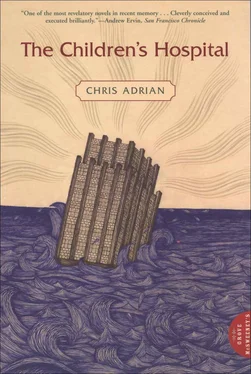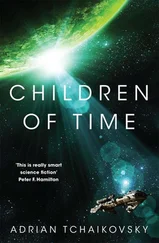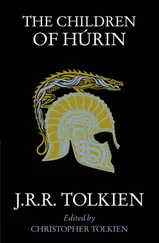“I see you,” says Pickie Beecher, walking by with a ladder over his shoulder.
“I see you too, you little freak,” says Wayne, not looking up from his whittling.
“You all look alike to me,” he says.
Wayne does not respond, but I say, It is because we are brothers and sister.
“The same eyes, the same face,” he says, walking on. He puts down his ladder by the stage and heads toward the playground. “And you all smell alike. Everyone else is starting to look like you, too. Not everyone, just the sick ones. Why is that?”
My brother is in them. The destroying angel.
“My brother is dead, killed by angels. I have never forgiven you. I never will.” He sits down on the edge of the playground, on one of the railroad ties that mark the border of the grass circle, takes off his shoes, and rubs his toes in the grass. Jemma lies a few feet away from us, where I left her, overcome by a sudden nap — at week twenty-nine this is her newest symptom, constant exhaustion and frequent naps. Dr. Tiller and Dr. Snood walk by, Dr. Tiller seeing in her sprawled form confirmation of her laziness, but Dr. Snood says, “Poor thing.”
Do you miss your brother? I ask. I miss my sister every day. My real sister, I mean.
“Stab,” says Pickie Beecher, poking himself sharply in the chest. “Stab! Stab! Stab!”
“Be quiet, child,” says Dr. Tiller, striding over, her headdress glittering in the far-falling sunlight. Pickie jumps up and stands over Jemma.
“If you hurt her,” he says. “Or if you hurt my brother inside of her, then I will consume you. I already know the taste of your flesh.” Then he opens his mouth to me, wider and wider, so his whole face seems to have become teeth around a black hole, and if I dared to look I could see the glaring red root of his abomination hanging in his middle. He snaps shut his teeth, making a sound like two heads knocking together. It hurts my ears to hear it.
“Don’t you threaten me,” Dr. Tiller says, handing Pickie a fat roll of demerits, and Jemma wakes.

It was called the botch, and a person was said to be stricken with it or not. Almost everybody acknowledged that it was a curse from God, but speculation abounded on whether there was not some natural and therefore treatable mediating agent — a virus or bacterium or toxin. Nothing was growing in the microbiology cultures, and blood and tissue samples taken from the victims — there were five of them now in the PICU — showed a haphazard and inconsistent range of anomalies. Dr. Sundae retreated deeper into her lab, where she and a variety of MD/PhDs were busy trying to isolate a causative agent, while the strictly clinical types were trying to write a predictive natural history. Rob was one of the latter. Jemma spent almost all her free time with him and the victims in the PICU.
She tried not to take as an affront all the hullabaloo over finding the virus — if there was a virus, wouldn’t she know, and wouldn’t Maggie have sprung back from death in as spritely a manner as any of the children? — and tried not to take personally the rumors that came back to her, that people were wondering if she weren’t just temporarily off her game, if she retained only the flashiness but not the substance of her gift, or if she hadn’t just let Maggie die because she hated her. “Everybody sure hated her,” said Karen, in marked display of poor taste at the memorial service held the day after she died. “Everybody hated her a lot. Sometimes I think she wanted people to hate her. That almost makes it okay, doesn’t it, if you hate somebody that kind of likes it, or at least expects it? I sure hated her, and I was one of her good friends.”
“I didn’t hate her,” Jemma said to Rob, both of them staring resolutely at the line of children dancing in somber black clogs in front of the square golden box that was Maggie’s coffin. They were supposed to be clogging joyfully, but some of them were clumsy with grief, and so their dance seemed hesitant and sad. “The kids liked her,” Jemma added. When the children were done dancing, and Father Jane had spoken, and they had all sung “A Clog and a Smile,” people drifted off back to their classes or their private worrying. To the accompaniment of a single flute (Dr. Tiller playing a tarantella), Maggie’s dry, black corpse, mostly ash except for a little doll-sized remainder, a bit of spine and lung and liver and bowel, that echoed her former, larger shape, was trundled off by a quartet of volunteers, to be sealed in the first basement, because nobody could bear to add another body to the ocean.
“I didn’t hate her,” Jemma said again, sitting in her old place in the PICU, the siege of exhaustion where she used to collapse halfway through her call nights and spend five minutes forgetting all her responsibilities and doing nothing. Rob was sitting across from her, talking on the telephone to Dr. Tiller. He hung up and rubbed his eyes. It was their two-hundredth day at sea.
“Her Helen Lane cells are dead,” he said.
“I thought she was immortal,” Jemma said, remembering the summer she spent doing an obligatory stint of research. She’d worked with a not very glamorous fungus, but Vivian, three labs over, was raising a virus in dish after dish of Helen Lane cells, and had become quite taken with the woman whose cancer had been living on in labs around the world for decades after her death. She had liked to tell stories about her, and for three months addressed all her diary entries to her, and claimed to have strange dreams where she followed screaming down telescoping white hallways to find Helen Lane strapped in a complicated torture machine, a gleaming collection of steel and glass knives and needles that made a quiet sort of chainsaw noise as it flayed her and then sewed on her skin. Release me, Vivian! she would shout, causing Vivian to feel very conflicted about her research all the next day.
“She fed them some of Karen’s blood and they died,” Rob said. “But not before they made multinucleated giant cells. I think we should put the ganciclovir back on everybody.”
“Sounds like a plan,” Jemma said. Rob jumped up, either ignoring or not noticing Jemma’s bored tone, and ran off down the hall toward the fellows’ call room, recently re-converted from a finger-painting studio. She wasn’t actually bored, though she affected a distinct air of aloofness from the medical proceedings in the PICU: they were doing their thing, she was doing hers, and she was not about to go back to being a kick-me-in-the-ass scut monkey after having wished away all the diseases of the old world. She still hoped that it would just be a matter of time, a matter of understanding, a matter of imagining a cure in the right context, before this one would fall to her.
She got up and made her usual tour, walking up and down the hall outside the bays that held each victim. She stood a while in front of each one, waving at the nurse behind the doors — Janie in a puffy suit — squinting with her natural eyes to see the patient, their images refracted by the glass doors and plastic isolation tent, while examining them simultaneously in her mind. The weeks passed and she felt more powerful in her gift — she didn’t have to touch a person to know how fast their heart was beating, or how well they were oxygenating their blood, or if they were hungry. It was in her more every day — some nights she felt so nervous and overstuffed with it that she would go up to the roof to hurl green fire at the sky — and yet she could still do nothing for the victims of the botch except scan them and describe their bodily deprivations. The boy, in the middle bay in the victims’ row, slept as soundly as ever, in perfect health as far as she could tell with either her natural or supernatural senses, while Wanda Sullivan, Aloysius Pan, Cotton Chun, Thelma, Karen, and Dolores lay before her in various stages of living decay, and she could not even restore the luster to Karen’s hair, let alone heal any of them.
Читать дальше













